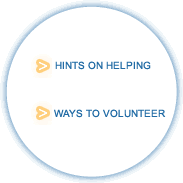You are here
Help Others
 HOW HELPING OTHERS HELPS YOU
HOW HELPING OTHERS HELPS YOU
If you lug your elderly neighbor's groceries up her steps, clearly it's good for her. But did you know that it's likely good for you too?
Research indicates that those who consistently help other people experience less depression, greater calm, fewer pains and better health. They may even live longer.
Consider some recent research:
 Students who performed five acts of kindness a day increased their happiness
Students who performed five acts of kindness a day increased their happiness- Providing emotional support to others significantly decreased the harmful health effects of certain kinds of stress among older people
- People who donated money to charity got a boost in a feel-good part of the brain, as revealed in brain imaging research
Doing good can make you feel good. It might
- remind you that you're relatively lucky
- make you feel connected to others
- help you feel needed and effective
- take your mind off your own worries for a while
- make you feel generous
- add a sense of purpose and meaning to your life
HINTS ON HELPING
Consider these tips for helping others—and yourself:
- Don't feel like you have to make grand gestures or huge time commitments. Sure, helping can mean serving meals at a homeless shelter every week. But it also can mean:
- Calling a friend to see how she's doing
- Serving your spouse breakfast in bed
- Letting a car in front of you on the highway
- Smiling at a stranger in the street
- Holding the elevator door for your co-worker
- Vary your acts of generosity to prevent the experience from becoming ho-hum, advises happiness researcher Sonja Lyubomirsky, PhD, who also found that doing several kindnesses in one day gives the best boost.
- Beware of taking on too much, or you'll risk feeling resentful. When asked a favor, think it over before saying yes.
WAYS TO VOLUNTEER
If you want to volunteer for an organization, invest in finding the right match. If you like to
- read... consider volunteering at a school or tutoring program
- work outdoors... try volunteering to clean up a local park
- speak another language.... perhaps work with immigrants
- work at home... make fundraising calls
- play sports... volunteer as a coach
- promote health... try a local hospital or clinic
Whatever you choose, ask if the group will provide support for your efforts, like training or a contact to answer questions that arise.
To find volunteer opportunities, call your city or county information line for the contact information for a volunteer coordinator service. You also can check your Yellow Pages under "Volunteer Clearinghouse" or "Volunteer Center" or find options online at Volunteermatch.org or 1-800-volunteer.org. Your local Mental Health America affiliate office also may be looking for volunteers.
Reviewed by Stephen G. Post, director of the Center for Medical Humanities, Compassionate Care, and Bioethics at Stony Brook University and author of Why Good Things Happen to Good People: The Exciting New Science That Proves the Link Between Doing Good and Living a Longer, Happier, Healthier Life.








this page